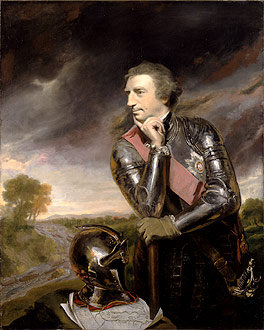The French Invasion of Britain
Final Stages of the War

William Pitt, leader of British armed forces during the war.
Final Stages of the War

William Pitt, leader of British armed forces during the war.
William Pitt saw his Empire burning around him. The dominance the British had acquired throughout the 18th century was unraveling. The situation in North America was unimaginable. Now the most populous colony on the planet was defenseless. The West Indies campaign was a failure; the British failed to capture any French territory and lost the island of Saint Kitts. Without a war in Europe, the French were simply able to outmatch the British in terms of men and equipment. The main weakness of Britain, its small population, was finally showing. The situation was so bad that the British were only able to convince the Spanish not intervene by promising massive swaths of North American territory. In fact the only positive thing for the British thus far was the capture of French India. William Pitt realized the French were not known restrain themselves. They would not accept a favorable peace now. They wanted more. There would be one more battle. But this battle wouldn’t be in a far away land. This battle would be on the Channel, the beaches, the fields, the towns, and the cities. It was an open secret that the French had been planning an invasion of Britain.
However, William was in no position to let the past dictate the conclusion of these troubling times. He prepared a thorough defense of the United Kingdom. He did have quite a few years to plan. As soon as it became evident the French war machine was slowing down, he recalled the fleets. Nearly all of the British warships around the world came back to the motherland. William needed as large of a navy as he could obtain in order to have a chance to repel the French. He also had a significant ground force. He would have seventy thousand regular British troops and tens of thousands of militiamen at his disposal. He knew, however, that he would still probably be outnumbered. His hope rested on the oldest and most valuable of advantages. The defender’s advantage.
By 1760 the French were ready to attack Britain. An army of one hundred and twenty thousand had been assembled at Boulogne. The largest European fleet ever constructed was waiting. Jean-François de La Clue-Sabran, a French admiral, was to lead the invasion. A man with as much power as he had should have felt nothing but happiness and content, but he did not. The French should not have been able to put a force this powerful together. France should not have been able to perform as well as it did throughout this war. A simpleton could see the French simply did not have the resources. France was in debt. An enormous, unimaginable amount of debt. One could also look at the soldiers. Strong and well fed. But how was this possible considering the large crop failures? The country was starving. The power the French had was just a thin film over a corrupt body. If the admiral did not win this battle, the results would be unthinkable.
Through their vast espionage networks the British were able to determine that the French would attack from Boulogne on the 18th of July and land at Dover. This was partially correct. The French had a small trick up their sleeve, however. The French would still depart from Boulogne on the 18th of July, but they would not land at Dover. Instead they would opt to land at Folkestone, which is 15km to the West, in order to encounter less resistance.
The 18th of July 1760.
The soldiers were awoken two hours before sunrise and were fed a hearty breakfast. This was the day everything could change. The weather was good. By sunrise everyone was in their barge and with fleet escort the French sailed into the enemy.
Lord Hawke was in charge of the British defense fleet. He had a very tough job ahead of him. He needed to strike in order to cripple the French fleet. But this was not the time. It was agreed upon that it would be unwise to engage the French during their preliminary invasion as they would choose a date where the weather conditions would be favorable for them. The British fleet would need to have all of the advantages it could. Preliminary reports showed the French fleet was actually slightly larger than its British counterpart. For now all Lord Hawke could do was sit at the sidelines and pick off a few stragglers as the enemy advanced towards his country.
The French ships reached the British shore two hours after noon. Just as expected, there was limited resistance as the British needed to reposition. The enemies waited. The French took three days to fully unload their supplies and men. During this time the British encircled Folkestone for optimal battle conditions. The battle of Folkestone began when the French general Charles de Rohan (Prince of Soubise) ordered a breakout. The battle, which lasted around twelve hours, was a decisive French victory. The massively outnumbered British did not stand a chance. The British suffered 50,000 casualties. It seemed the British were doomed. London was in chaos. William Pitt began to draft a declaration of surrender. All that stood between the French and London was 100km of flat ground. The French marched forward.
There was one last hope for the British. While the French landed in near perfect weather, the conditions began to rapidly change. A massive storm came to the Channel. The entire sea was enraged in chaos. Lorde Hawk saw a bold and perhaps reckless opportunity in front of him. He could attack. He would be outnumbered. He would be outgunned. But this was perhaps the only thing that even had a miniscule chance of preventing certain defeat. He along, with the 90 ships of the line he commanded engaged the French on the 25th. The resulting battle would be simply be known as the battle of the channel. It would be the largest naval battle for a century. Just after the British began engaging the French the weather took an even worse turn. But neither side refused to retreat, the stakes were too high. The Gusts were so powerful that the ships on both sides were without communication. The battle could only be described as chaotic. Cannons were fired. Ships simply crashed into each other. Lightning killed dozens. Many ships just sank, without taking a single shot. The weather finally ended when the sun rose. The water was laden with plywood and corpses. The outcome of the battle was astonishing. Of the 110 French ships of the line that participated only two escaped; and they were both badly damaged. The British won, but at a massive cost. Only 9 of their ships escaped. It has been estimated that nearly one hundred thousand people died on that night.
There were many factors that contributed to the British victory. The French were forced to rush the construction of their fleet. This led to a lower quality fleet in terms of design and leadership.
The situation for the French was becoming dire. Their supply line was cut and there was no hope of it being reestablished. No further reinforcements would come. What the French had now was all they would ever have. It was now truly a race for London. There could be no diversions. However there was some hope. The French still massively outnumbered the British armed forces.
William Pitt devised a new strategy, given the recent circumstances. It borrowed extensively from the French doctrine in North America. Total war. The French only had so much time before their resources were exhausted. The British needed to compound these problems. The British burnt their own towns, sacked their own farms, and destroyed their own bridges. There would be nothing left for the French. The British would also not attempt to engage the French with their remaining forces until they reached London. The British forces would need as many men and resources as they could acquire. Until then all the British would do is stall for time.
The French reached the outskirts of London on the 14th of August. The army numbering around 85,000 was tired and hungry, but still strong. They knew what they had to do. They were to face the 45,000 regulars and countless untrained militiamen of William Pitt. The battle of London was brutal. There were massive instances of street fighting. There were no rules to the battle. Both sides did whatever was possible to win. In the end the French succumbed to the enemy’s defensive advantage. The French army surrendered 24th of August. But the French certainly did a lot of damage. Over a million people were displaced. Over one hundred thousand British soldiers lost their life. But perhaps the most damaging thing the French did was cause the Great Fire of London (1760). The fire, caused by French artillery hitting a British arms depot, quickly spread out of control. While the French were never able to cross the Thames, the fire found no difficulty. It found its way to nearly all of London. Not even Buckingham palace was saved from the flames. George II, who wished to stay for battle, was evacuated just hours before the fire came. It took nearly two weeks to extinguish the conflagration.
Britain and France were in ruins. The time had come for peace.

London Burning
